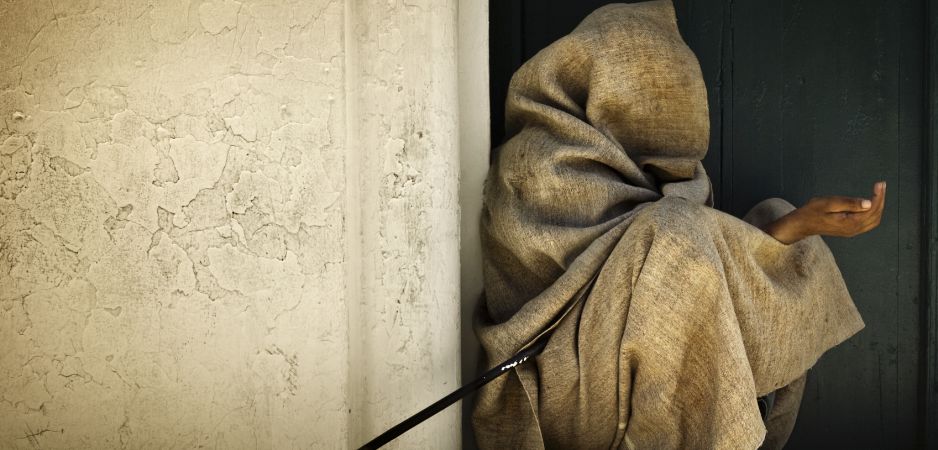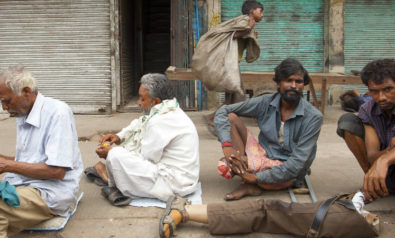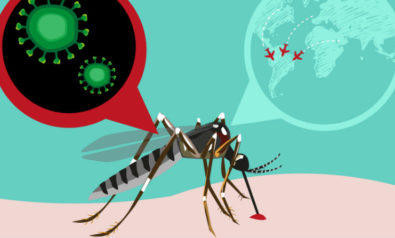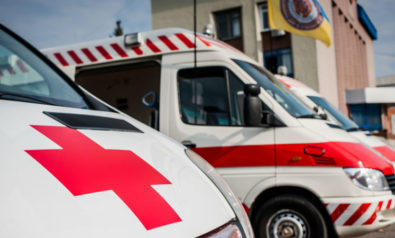Faced with a choice between using their sparse income to access anti-retroviral therapy or nourishment, many affected by AIDS in Africa opt for the latter.
In July, UNICEF issued a stark warning that the El Nino climate cycle had created a humanitarian disaster in the developing nations most prone to its effects. The severe flooding and drought caused by El Nino had resulted in widespread hunger, malnutrition and disease in parts of eastern and southern Africa, the organization warned, while cautioning that La Nina—El Nino’s counterpart—would likely exacerbate the situation.
As well as ravaging many African nations’ economies and directly causing high levels of starvation, the chaos created by El Nino is expected to trigger a large uptick in HIV/AIDS infection levels and death rates in the region. Faced with a choice between using their sparse income to access anti-retroviral therapy (ART) drugs or nourishment, many Africans in affected countries who have the virus are opting for the latter. At the same time, impoverished African women and girls whose lives have been made worse as a result of El Nino’s effects are turning to sex work in increasing numbers, putting them at a higher risk of becoming HIV positive.
Worst Famine Since 1985
It’s a sad fact that governments in the region are unable feed their malnourished populations, let alone treat victims of the most serious HIV/AIDS epidemic on the planet. According to a Bill and Melinda Gates Foundation-sponsored article for The Observer, Africa is facing the worst famine it has experienced since 1985—a situation that is being made worse by the fact that donor nations are preoccupied with ongoing war in the Middle East and the European migrant crisis. According to the United Nations (UN), more than $650 million of aid and 7.9 million tons of food are required immediately to prevent the worsening famine in Africa from becoming severe by Christmas.
Middle East unrest and the resultant flow of migrants across the Mediterranean aside, the main reason the required funds are not reaching the African nations most affected by El Nino is donor fatigue, highlighting the importance of encouraging countries in the region to develop their own economies so they are better placed to support themselves.
Indeed, donor funding to some of Africa’s poorest countries began to slow considerably after the global financial crisis of the late 2000s, and has failed to pick up again as the world economy has stabilized, making it all the more important that African nations are able to stand on their own feet.
Outgrowing the AIDS epidemic
It can be done, as the landlocked African nation of Botswana has demonstrated. Almost 25% of all adults in Botswana are HIV positive, making the country second only to Swaziland in terms of infection rates. To address this, the Botswana government has managed to establish and manage one of the most effective HIV/AIDS treatment programs in the whole of Africa. The country offers all infected citizens ART drugs for life.
It has been able to do this, as well as becoming one of the most stable countries in Africa, thanks to its economic independence. According to the World Bank, Botswana has grown from being one of the poorest nations in Africa when it first declared independence from the United Kingdom in 1966 to one of the fastest growing economies in the world. It has achieved this thanks to the success of its diamond mining operations, which are forecast to help the country’s economy grow considerably faster than many developed nations over the next couple of years.
While it is true that Botswana’s neighboring countries could not hope to emulate its success without discovering natural resources similar to its hugely profitable diamond mines, opportunities do exist on the African continent, especially in Mozambique, which is rich in offshore natural gas.
In order to protect its economic future from the scores of pirates operating in its waters, the country decided to invest in buying a number of patrol vessels using government-backed bonds through the state-owned fishing company, EMATUM. If Mozambique can successfully exploit the opportunity presented by its gas reserves as energy prices rise, it could follow in the footsteps of Botswana toward a future where its fortunes are not reliant on donor funding during times of crisis.
 Subscribe to Fair Observer for $10 a month and we will gift you our e-publications and invite you to inspiring events.
Subscribe to Fair Observer for $10 a month and we will gift you our e-publications and invite you to inspiring events.
This will take time. Until Mozambique and other African countries are able to harness their natural resources and build self-sufficient economies that are able to withstand the effects of disasters such as El Nino, most of the continent will remain vulnerable to both HIV/AIDS outbreaks and malnutrition.
While countries get to grips with the significant task of realizing the opportunities they could enjoy, it is vital that donor nations make sure Africa’s food supplies and health care systems do not fall apart. While it may be the case that the world’s attention is focused on serious issues elsewhere at present, a failure to support African nations as they seek to forge strong economies that are able to weather disasters without the need of excessive amounts of external aid will only end up costing developed nations more over the longer term.
The recent Tokyo International Conference on Africa’s Development (TICAD)— where the World Bank’s Global Fund along with Japan and other partners announced a commitment of $24 billion to help accelerate the expansion of universal health coverage in Africa—was a good starting point. But developed nations must realize that money spent on African aid now could prevent them from having to continue to shell out on the region’s problems in perpetuity.
The views expressed in this article are the author’s own and do not necessarily reflect Fair Observer’s editorial policy.
Photo Credit: Cinoby
Support Fair Observer
We rely on your support for our independence, diversity and quality.
For more than 10 years, Fair Observer has been free, fair and independent. No billionaire owns us, no advertisers control us. We are a reader-supported nonprofit. Unlike many other publications, we keep our content free for readers regardless of where they live or whether they can afford to pay. We have no paywalls and no ads.
In the post-truth era of fake news, echo chambers and filter bubbles, we publish a plurality of perspectives from around the world. Anyone can publish with us, but everyone goes through a rigorous editorial process. So, you get fact-checked, well-reasoned content instead of noise.
We publish 2,500+ voices from 90+ countries. We also conduct education and training programs
on subjects ranging from digital media and journalism to writing and critical thinking. This
doesn’t come cheap. Servers, editors, trainers and web developers cost
money.
Please consider supporting us on a regular basis as a recurring donor or a
sustaining member.
Will you support FO’s journalism?
We rely on your support for our independence, diversity and quality.


















